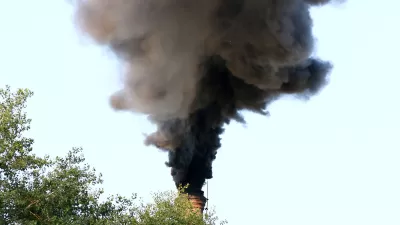A new study builds an even stronger case for setting pollution controls at PM 2.5 to prevent increased risk of diabetes. The EPA's clean air regulations set a threshold much less restrictive than that level.

Olga Khazan reports: "It’s fairly well known that a bad diet, a lack of exercise, and genetics can all contribute to type 2 diabetes. But a new global study points to an additional, surprising culprit: the air pollution emitted by cars and trucks."
The study, published in the journal Lancet Planetary Health, builds on previous research with a larger study and additional controls (more on the methodology is included in the article). "What’s more, it also quantifies exactly how many diabetes cases in the world are attributable to air pollution: 14 percent in 2016 alone. In the United States, it found, air pollution is responsible for 150,000 cases of diabetes," according to Khazan.
The findings of the report suggest that current U.S. clean air regulations don't go far enough. Despite that concern, Khazan adds in more detail, the Trump Administration is moving in the opposite direction on clean air regulations.
FULL STORY: A Frightening New Reason to Worry About Air Pollution

Maui's Vacation Rental Debate Turns Ugly
Verbal attacks, misinformation campaigns and fistfights plague a high-stakes debate to convert thousands of vacation rentals into long-term housing.

Planetizen Federal Action Tracker
A weekly monitor of how Trump’s orders and actions are impacting planners and planning in America.

In Urban Planning, AI Prompting Could be the New Design Thinking
Creativity has long been key to great urban design. What if we see AI as our new creative partner?

King County Supportive Housing Program Offers Hope for Unhoused Residents
The county is taking a ‘Housing First’ approach that prioritizes getting people into housing, then offering wraparound supportive services.

Researchers Use AI to Get Clearer Picture of US Housing
Analysts are using artificial intelligence to supercharge their research by allowing them to comb through data faster. Though these AI tools can be error prone, they save time and housing researchers are optimistic about the future.

Making Shared Micromobility More Inclusive
Cities and shared mobility system operators can do more to include people with disabilities in planning and operations, per a new report.
Urban Design for Planners 1: Software Tools
This six-course series explores essential urban design concepts using open source software and equips planners with the tools they need to participate fully in the urban design process.
Planning for Universal Design
Learn the tools for implementing Universal Design in planning regulations.
planning NEXT
Appalachian Highlands Housing Partners
Mpact (founded as Rail~Volution)
City of Camden Redevelopment Agency
City of Astoria
City of Portland
City of Laramie





























